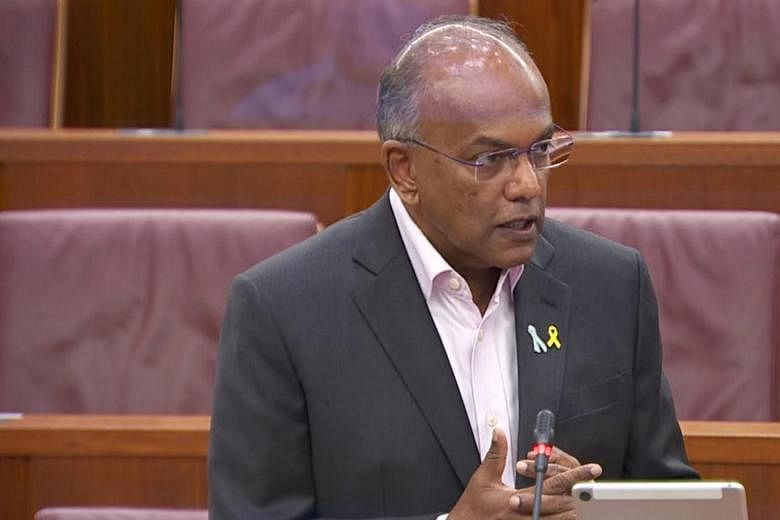SINGAPORE - A mindset change is needed to instil respect for women, and the answer does not lie with the law alone, noted Law and Home Affairs Minister K. Shanmugam on Friday (March 5).
His remarks in Parliament came in response to Ms Carrie Tan (Nee Soon GRC), who asked if laws will be made to protect women against sexual objectification.
Mr Shanmugam had earlier delivered a ministerial statement on proposed steps to further enhance criminal laws as part of the Government's tough approach on sexual and hurt offences. These include raising the maximum jail terms for three specific sexual offences.
Ms Tan said: "I think the general societal exposure to sexual content victimising or objectifying women might be something that we want to address on a broader scale."
Mr Shanmugam said the issue was beyond the remit of Home Affairs and Law: "You know, these cases where the boys go into girls' toilets in universities and take a video, and they think of it as a prank or something that's cool to do. How does that mindset come about?
"And if we approached it simply from a criminal law perspective, we will keep putting these boys into prison."
While a tough approach has to be taken, what is really needed is a change of mindset, said Mr Shanmugam, noting that the Government had started a broad-based conversation in September last year on the position of women.
"Every boy and girl has got to grow up learning that respect for women is a non-negotiable point," he added.
"And therefore, it's not cool to go and do this. It's not just a prank, it's a serious violation of a fundamental value. That is the approach we have to instil."
Mr Shanmugam said there were "very powerful countervailing forces" in a context where "people will do everything possible to push their products, including objectifying women in the process".
Ms Sylvia Lim (Aljunied GRC) sought clarifications on the proposed policy that the Attorney-General's Chambers (AGC) will generally object to rehabilitative sentences for adults who commit certain sexual and hurt offences.
She asked Mr Shanmugam to confirm that this did not undermine prosecutorial discretion.
His reply: Absolutely not.
"You will have cases where individuals (are) intellectually challenged, didn't know what they were doing was right or wrong or on the margin; these are not matters that we can set out in broad terms here in Parliament, and AGC will have to decide case by case, and the courts have to decide case by case," he said.
Mr Alex Yam (Marsiling-Yew Tee GRC) asked if penalties for sexual and hurt offences will be enhanced for those who are in a position of trust in relation to their victims.
He cited recent cases of teachers molesting students, medical professionals molesting patients and a statutory board director molesting a subordinate.
Mr Shanmugam replied that abuse of a position of trust is already a factor highly relevant in sentencing.
Mr Christopher de Souza (Holland-Bukit Timah GRC) asked if existing enhanced penalties for offences against domestic workers can be widened to include people who are in a position of vulnerability because of their employment.
An employer convicted of offences against maids may be sentenced to twice the maximum penalty prescribed by law.
Mr Shanmugam replied that the various categories of vulnerable victims have been covered, "but I'll be happy to ask my ministry to relook at it".


